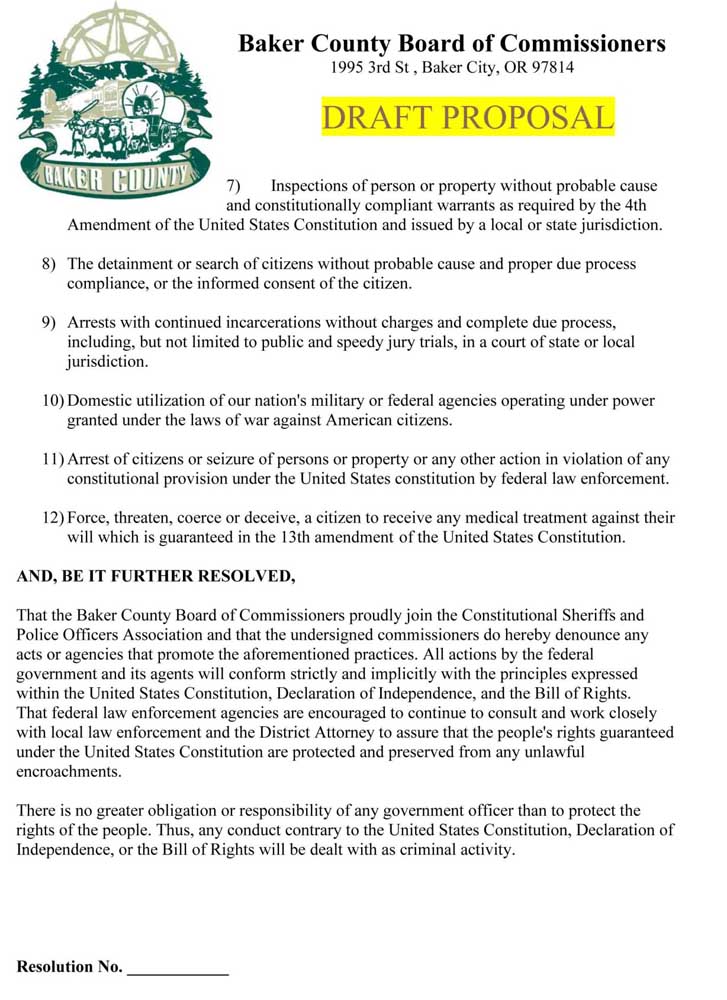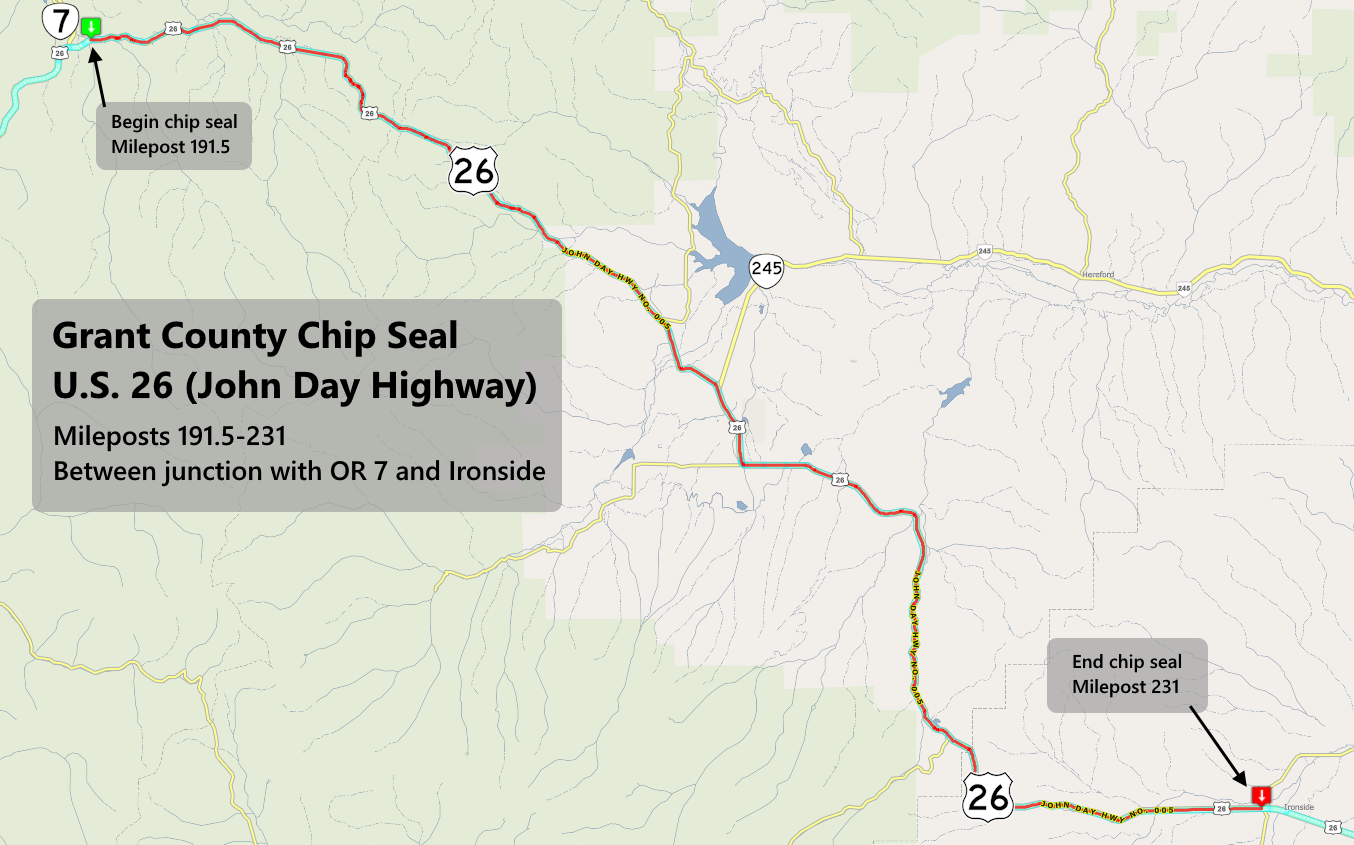County passes constitution resolution
Published 1:45 pm Wednesday, April 20, 2022

- Second page of resolution Baker County United submitted to the Baker County Board of Commissioners in December 2021.
BAKER CITY — Baker County commissioners voted 2-1 on Wednesday, April 20, to pass a resolution “re-affirming the constitutional rights of Baker County citizens,” four months after a local group asked commissioners to approve a similar, but more comprehensive, document.
Commission Chairman Bill Harvey and Commissioner Mark Bennett voted in favor of the resolution.
Commissioner Bruce Nichols, who said he agrees with most of the sentiments in the resolution, voted no because he disagrees with the way Baker County United initially presented its version to commissioners in December 2021.
“I agree with the Second Amendment, I agree with not having vaccine mandates and almost everything else (in the resolution),” Nichols said. “The way this was portrayed initially to me was the main reason that I will not sign this resolution.
“I felt you were trying to force this on this commission, and that’s what makes me get angry about it,” Nichols said.
Harvey said he thinks the resolution is beneficial to county residents.
“I believe this is a good position and stance for the county and to strengthen our position as far as saying to the public that we will not come after you for something that you believe is unconstitutional,” Harvey said.
Harvey said that as a governing body, the commissioners are “here not to enforce anything that offsets the Constitution.”
“We already have never enforced anything on a citizen that is against their conscience, based on the Constitution of the United States,” Harvey said. “This is just reaffirming our position as a county government that Baker County will not go marching into the stores and say, that person is not wearing a mask, we’ll put them down, shove a mask on their face just to enforce a law or whatever it might be. That’s not our role nor is it our authority.”
When Baker County United submitted its proposed resolution to commissioners in December, an executive order issued by Oregon Gov. Kate Brown requiring people to wear masks in most indoor public settings was still in place. That requirement ended March 12.
Jake Brown of Halfway, a member of Baker County United, said he was disappointed by the deletions and other changes that commissioners made to the original proposal.
Brown said he and others who brought the original resolution to commissioners do not support the version commissioners passed, and do not want their names associated with it.
“It was our hope that we could have a local government that would stand up and ally with us,” Brown said.
Both resolutions have a list of activities that are “not allowed or tolerated within Baker County.”
Baker County United’s proposal has 12 such items, whereas the version commissioners approved has 10. The latter version combines two parts from the former into one section, both of which deal with gun rights.
The combined section in the resolution commissioners approved reads: “Expanding requirements regarding registration of personal firearms, contrary to 2nd Amendment protections, nor the confiscation of firearms without probable cause, due process, and Constitutionally compliant warrants issued by an authorized jurisdiction.”
There’s also a difference in the wording preceding the list of prohibited activities. Baker County United’s version refers to these as “abuses,” while the county’s version calls them “acts.”
Brown said each section in Baker County United’s (BCU) original resolution was closely linked to an amendment in the U.S. Constitution.
He objected to the county’s version dealing with the use of “Force, threaten, coerce or deceive, a citizen to receive any medical treatment against their will.”
The county’s version says this is guaranteed in the 14th amendment, while BCU’s cites the 13th amendment.
“Changing that from the 13th amendment to the 14th, gives it the opposite effect of what we intended,” Brown said.
The 13th amendment, ratified in 1865, abolished slavery in the United States and provides that “Neither slavery nor involuntary servitude, except as a punishment for crime whereof the party shall have been duly convicted, shall exist within the United States, or any place subject to their jurisdiction.”
The 14th amendment, adopted in 1868, has five sections, one of which granted citizenship and equal civil and legal rights to African Americans and enslaved people who had been emancipated after the American Civil War.
That section of the amendment states: “All persons born or naturalized in the United States, and subject to the jurisdiction thereof, are citizens of the United States and of the state wherein they reside. No state shall make or enforce any law which shall abridge the privileges or immunities of citizens of the United States; nor shall any state deprive any person of life, liberty, or property, without due process of law; nor deny to any person within its jurisdiction the equal protection of the laws.”
County counsel Kim Mosier explained why she changed the reference from the 14th amendment to the 13th.
“That medical treatment piece, I did some research on that, and in the original it references the 13th amendment,” Mosier said. “I did find some case law regarding the 13th amendment and coercive medical treatment and the cases that I see that relate to the 13th amendment are Supreme Court cases that say that you can’t require medical providers to treat and that is a violation of the 13th amendment.
“The 14th amendment, there is a 1905 case that says the government cannot force, threaten, coerce, or deceive a citizen into receiving medical treatment against their will. So, that is counter to the Constitution under the 14th amendment,” Mosier said.
BCU’s original resolution included a clause stating that “Baker County Commissioners proudly join the Constitutional Sheriffs and Police Officers Association and that the undersigned commissioners do hereby denounce any acts or agencies that promote the aforementioned practices.”
Brown said earlier this year that BCU deleted that clause from its proposed resolution.
Nichols, responding to previous questions from BCU members who asked commissioners to reaffirm their oath of office, said he believes he does that every time he recites the Pledge of Allegiance at the start of a meeting.
Nichols also asked supporters of the original BCU resolution to recognize that although many people support that document, other county residents have different opinions.
“We’re supposed to be representing all of the people,” Nichols said. “Whatever we do, there is always somebody that disagrees with us. I don’t care what it is, there’s always somebody that disagrees.”
Bennett pointed out that although the resolution states that “no agency established by the U.S. Congress can develop its own policies or regulations which supersede the Bill of Rights or the Constitution,” county commissions do not determine whether or not an action is constitutional.
That task, Bennett said, is delegated in the Constitution to the judicial branch of government.






